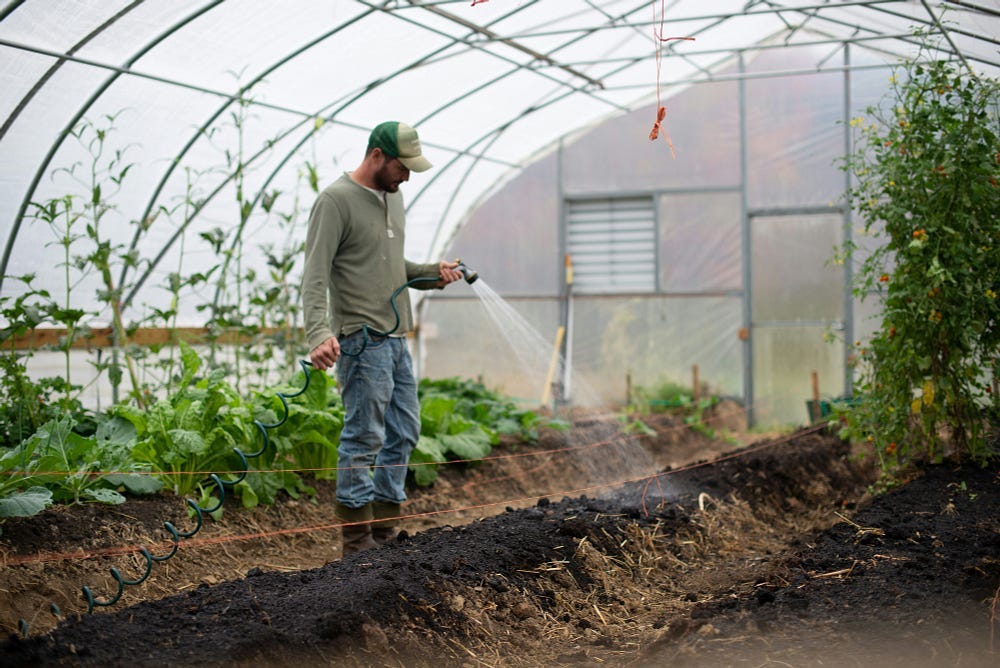
Humanity is in overshoot, and a major correction is already underway, something, which will only accelerate even further. A runaway energy crisis, together with resource depletion, climate change and ecosystems collapse will upend centuries of growth and prosperity. But what does that mean on an individual level? Is there any way to course correct? If not, what are the possible ways of adaption?
The world economy faces a runaway energy crisis, not seen by most commentators. The energy needed to extract the next unit of both oil and minerals increases exponentially due to rich depleted deposits being replaced with ever poorer quality ones. Since energy is the economy, not money, an exponential rise in this area will eventually make further expansion impossible, and lead to a relentless decline. Something, which cannot be stopped, nor financed without bankrupting the economy... In the meantime, both investors and politicians act as if energy were just a cost item, and its supply could expand without any hurdles. What could possibly go wrong?
We are clearly approaching a civilizational tipping point, and there is nothing anyone in power can do about this. The entire process is driven by physics and geology, not wishful thinking and clever humans supposedly inventing their way out if this mess. However, if you were following the logic of how we got here so far, I don’t think it is realistic to say that the passing of this inflection point will suddenly upend civilization, and push everyone, everywhere back into the stone age in a matter of years. Instead, we are about to walk down a long winding road fraught with all sorts of perils, and have to prepare ourselves accordingly.
Hunkering down in a bunker, and piling up years worth of canned beans, is unlikely to see you through this process lasting at least half a century for the bumpy part, and another couple of hundred years till the dust settles.
That is not to say, that we may not fall off a cliff, and face extinction level threats along the road. Nuclear war is a real (and unfortunately growing) danger, especially if Europe decides to enter the fray on the eastern front. If that happens, though, no amount of prepping would save you. Should even just a modest amount of mushroom clouds rise over the horizon, a large enough amount of dust would be injected into the stratosphere to screen sunlight, and cause a nice little nuclear winter lasting many years. A global annihilation could easily usher in another ice age.
Freezing temperatures would be the norm even during the summer, preventing any crops to be grown around much of the world, with dire consequences to match. What’s worse, the large amounts of nitrous-oxides generated by the exploding fire balls would wreck the ozone layer… So, when the dust settles, not only climate change would return with a vengeance, but a combined dose of UV and nuclear radiation would make sure that no human could survive the experience. Even if you had food for a decade, you would be immediately fried crisp as soon as you resurface to grow crops — not to mention the billions of other-than-human living beings responsible to maintain a healthy ecosystem. With or without bunkers, nuclear war is not a good idea, and everything must be done to mitigate the risk of it visiting us.

OK then, if dugouts are not an option, should I prepare with combat skills and loads of ammo to fend of marauders, after the economy collapses? Well, ask your self: what happened the last time when net energy peaked, and the economy collapsed? Did people start to shot each other dead en masse during the 1930's? I don’t think so. Contrary to the myths of overproduction and a stock market crash in 1929, the Great Depression was caused by the very same predicament we face today — the depletion of rich reserves of the master energy resource of the day (coal). Oil, of course was already in use then, but it wasn’t the fuel powering the economy. Only when adequate methods and machinery were developed to switch from a coal based economy to an oil based one did the depression end. (It shouldn’t come as a surprise then, that during the ensuing second world war one of the major goals of the Axis powers in both theaters was to get hold of rich petroleum reserves, ultimately to decide who will lead this new world order based on oil, after the previous one based on coal fell.)
In this sense one could say that we should prepare for another World War. But I also have to ask: fought over what? Unlike the previous one fought over oil, there is no alternative fuel — entirely independent from the previous one — waiting in the wings. Nuclear, wind and solar remain hopelessly dependent on diesel in every step of their lifecycle, so along with uranium and rare earth mines, one would also have to secure reliable petroleum resources as well; besides coal and natural gas to secure a stable electricity supply and the high heat needed to run the industry.
Actually, this was one of the prime reasons why weakening (and ultimately ‘decolonizing’) the largest country on the planet was high on the agenda for the West. Now, as that attempt has backfired disastrously, and as all the major energy producers in the Eurasian continent are busy building out a new alliance, there is nothing left to do for the West than to panic and do all sorts of stupid things. I can but hope, that escalating World War III to a nuclear threshold is not one of them…
So no, combat skills and guns will not save you. If my thinking is right, and I fully agree with Tim Morgan here, instead of another world war we are heading into a re-run of the Wall Street crash and the ensuing Great Depression… On steroids. A cascade of defaults and asset price crashes, and a full-on resort to money-printing; resulting in an uncontrollable surge in inflation. And while assets, like your home, will worth much less, it would be still much better to own them, than to owe it to the bank. Many businesses will go bankrupt though due to increased energy and transportation costs, raw material and equipment shortages, and an overall collapse of profitability (especially in the material and energy intensive electrification business).
On top of it all, and not at all inconsequentially, we are also facing a major political crisis throughout the entire West; quite probably with a similar outcome like what we have seen in the case of the Soviet Union in the late 1980’s and early 1990’s. The West didn’t won the (first) cold war, it just happened to go last. As a consequence, the union of states on both sides of the Atlantic seems to be ripe for falling apart (for different reasons of course), but not at all independent from the economic depression caused by a fall in net energy availability.

Financial independence, and owing tangible items of value on the other hand seems to me one of the more viable strategies for the upcoming years. One of these assets could be owning a small patch of land and the knowledge on how to grow food. Not with a goal of self-sufficiency — that takes much more land and work than any one of us could imagine — but for growing vegetables and fruits: food items, getting crazy expensive these days. I don’t think we are facing mass famines, even if the mother of all financial crashes pays a visit: the production of basic necessities will always be a key priority for even the most distressed economies. While there might be serious disruptions, or even chronic shortages of all sorts of items, you will most probably find something to eat. With rising fuel and fertilizer costs, droughts and heatwaves, however, the costs of producing food will increase further still; leading to ever higher grocery bills, and leaving barely anything left to spend on non-essential goods and services. So while it will be impossible to bug out this period of economic hardship on canned food, having a small stockpile of non-perishable items might actually be a good approach — with an added bonus feature.
Having a few extra packs of coffee, tea, sugar, tobacco, or a few extra bottles of wine to trade for services in case of a hyperinflation or an economic / political collapse is always a good idea.
Another basis of trade in a post-bubble, post-industrial economy is skills and useful knowledge. People lacking money to spend on anything but food, can be extremely creative when it comes to reusing, repairing and repurposing goods. Thus knowing how to repair an engine, or electronic devices, or how to mend clothes, could go a long way towards thriving in a post-collapse environment. Similarly, having a medical education, or at least some first aid skills and a general knowledge on how to treat common ailments, could earn you a great respect and high status in any community — not to mention having the sacred knowledge of brewing beer. Don’t laugh, simple things like this can make a huge difference in a post-industrial world, lacking the conveniences we take for granted today.

Moving to a smaller, easier and cheaper to heat/cool home is also one of the strategies to cope with the coming contraction. Small is not only beautiful, but more energy efficient and easier to maintain, too. The tiny house movement has definitely a bright future. If that is not an option, insulating your existing home and improving energy efficiency can also be a viable way of reducing your costs, and environmental impact at the same time.
Keeping up a good spirit, a positive can-do attitude and a strong will needed to soldier on, however, will be your biggest and most important assets. Don’t wait for the government, the “Market”, Santa Claus or the Tooth Fairy to take care of you: they will be busy taking care of themselves. We are entering a centuries long era of flux and uncertainty, a time of troubles as the Chinese called these periods in their own history. That is not to say that our numbers will not dwindle, but a birth crisis together with deaths of despair and a lack of adequate healthcare will reduce population below unrecognizable levels — even without major wars or a famine.
Make sure you take care of your health, and of those around you, both physically and mentally.
The sooner you accept such periods as perfectly normal, the sooner you can move on towards practical steps in everyday life, and will be able to accept the economic realities of a civilization in decline. Collapse is a feature of human civilization, a common trait with all complex systems. Something, which is entirely due to a natural cause, overshoot, and all its symptom predicaments: resource depletion, a net energy crisis, political upheaval, climate change, ecosystem degradation and so on.
I know it is hard. But it is also perfectly normal. Think about that.
Happy Easter Monday and until next time,
B
Thank you for reading The Honest Sorcerer. If you would like to support my work, please subscribe for free or consider an annual subscription, perhaps leaving a tip. Every donation helps, no matter how small. Thank you in advance!







Off-grid and feeling good about it. Diesel stores ok and would add that to the list as it would become very valuable if certain lines were crossed
This a very poor effort.
I stopped here:
However, if you were following the logic of how we got here so far, I don’t think it is realistic to say that the passing of this inflection point will suddenly upend civilization, and push everyone, everywhere back into the stone age in a matter of years. Instead, we are about to walk down a long winding road fraught with all sorts of perils, and have to prepare ourselves accordingly.
The Long Emergency ... is almost over.
We are currently looking at a situation where inflation is not abating despite a big increase in interest rates. Something is gonna bust... and when it does... the descent into hell will be very rapid indeed.
When the financial system snaps ... the lights will go off - permanently... and global supply chains will halt. That means no food. That means mass murder - rape - disease - starvation - cannibalism.